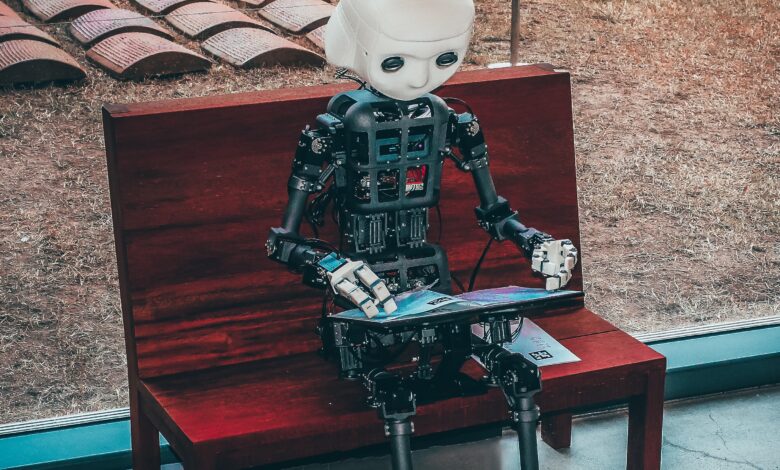Will AI Replace Jobs? The Truth About Automation and the Future of Work

AI is changing work. Many people worry about losing jobs. Others see new opportunities. The truth is in the middle. This article explains what will really happen.
1. Jobs Most at Risk From AI
Some jobs will disappear. These share common traits:
- Repetitive tasks
- Routine processes
- Simple decision-making
Top 10 Jobs AI Will Replace First
- Data entry clerks (AI reads forms faster)
- Telemarketers (Chatbots make calls)
- Bookkeepers (Software automates accounting)
- Cashiers (Self-checkout grows)
- Basic customer service (AI answers common questions)
- Assembly line workers (Robots don’t get tired)
- Proofreaders (Grammarly checks grammar)
- Basic graphic designers (Canva AI makes logos)
- Routine legal assistants (AI reviews contracts)
- Stock traders (Algorithms trade faster)
Timeline: Many will decline by 2030.
2. Jobs AI Will Change (But Not Replace)
Some jobs will transform. Workers must adapt.
10 Changing Professions
- Doctors (AI assists diagnoses)
- Teachers (Personalized AI tutors help)
- Writers (AI drafts first versions)
- Bankers (AI handles routine transactions)
- Farmers (Drones monitor crops)
- Architects (AI generates designs)
- Journalists (AI writes basic reports)
- HR recruiters (AI screens resumes)
- Salespeople (AI qualifies leads)
- Scientists (AI runs simulations)
Key: Humans still make final decisions.
3. Jobs AI Can’t Replace
Some skills remain human-only.
10 Safe Professions
- Therapists (Needs human connection)
- Nurses (Requires physical care)
- Police officers (Judgment in complex situations)
- CEOs (Strategic leadership)
- Artists (Original creativity)
- Plumbers (Physical problem-solving)
- Childcare workers (Emotional care)
- Priests/Rabbis (Spiritual guidance)
- Professional athletes (Physical performance)
- Event planners (Complex coordination)
Why? These need:
- Emotional intelligence
- Physical dexterity
- Creative problem-solving
4. New Jobs AI Will Create
History shows technology creates new work.
10 Future AI Jobs
- AI trainers (Teach AI systems)
- Prompt engineers (Optimize AI commands)
- Robot mechanics (Fix AI systems)
- Data detectives (Find AI mistakes)
- AI ethicists (Ensure fair algorithms)
- Virtual world designers (Build metaverse)
- Digital privacy managers (Protect data)
- Human-AI mediators (Resolve conflicts)
- AI maintenance techs (Keep systems running)
- Customization specialists (Tailor AI for clients)
Growth area: Jobs combining tech and human skills.
5. How to Future-Proof Your Career
Don’t fear AI. Prepare for it.
5 Essential Future Skills
- AI literacy (Understand basic AI tools)
- Creativity (What AI can’t replicate)
- Emotional intelligence (Human connection)
- Complex problem-solving (Beyond algorithms)
- Continuous learning (Stay updated)
5 Action Steps
- Audit your job (What parts could automate?)
- Learn AI tools (For your industry)
- Develop human skills (Like leadership)
- Watch industry trends (Stay ahead)
- Build adaptability (Embrace change)
6. What Companies Are Doing
Businesses must balance AI and workers.
Smart Approaches
- Retraining programs (UPS trains drivers for new tech)
- Human-AI teams (Doctors + diagnostic AI)
- Phased transitions (Slow automation rollout)
Mistakes to Avoid
- Full automation too fast (Loses customer trust)
- Ignoring worker fears (Causes resistance)
- No retraining budget (Wastes talent)
7. Government Responses Worldwide
Leaders are taking action.
Key Policies
- Singapore: Pays workers to learn AI skills
- Germany: Limits retail automation to protect jobs
- Canada: Tests universal basic income
- California: Taxes robot workers
- EU: Requires human oversight of AI
Debate continues on best approaches.
8. Historical Perspective
Technology always changes work.
Past Examples
- 1900s: Cars killed buggy jobs but created auto industry
- 1980s: ATMs reduced tellers but increased bank services
- 2000s: Internet killed some retail but created e-commerce
Pattern: More jobs created than lost long-term.
9. Positive Outcomes Possible
AI could improve work life.
Potential Benefits
- Less boring work (AI handles routines)
- More creative jobs (Humans focus on ideas)
- Shorter work weeks (Higher productivity)
- Better jobs (More meaningful work)
Example: 4-day weeks testing in some AI companies.
10. What You Should Do Now
Practical steps for everyone.
For Employees
- Take an AI course (Many are free)
- Talk to your boss (About company plans)
- Build an adaptable skillset
For Employers
- Be transparent (About automation plans)
- Invest in training (Not just technology)
- Redesign jobs (Combine human+AI strengths)
For Students
- Study future-proof fields (Healthcare, trades)
- Develop tech skills (Basic coding helps)
- Practice creativity (Join arts or debate)
Final Answer: Will AI Take Your Job?
Most likely:
- Your job will change, not disappear
- Routine parts will automate
- New tasks will emerge
- Human skills become more valuable
The best strategy:
✔ Learn to work with AI
✔ Develop uniquely human skills
✔ Stay flexible
AI won’t replace all workers. It will replace workers who don’t adapt. The future belongs to those who embrace change.
What’s your plan? Share how you’re preparing below.




